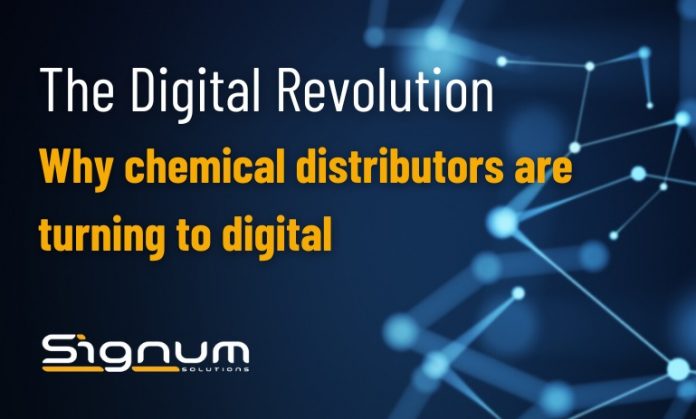The global chemical industry has long been a pioneer in adopting new technologies, from the rise of the internet to big data analytics. But, like many industries, the pace of change has accelerated in recent years and now it’s time for chemical companies to embrace digital technology as a way to improve efficiency and the overall customer experience.
The challenge for chemical distributors is that they’re facing shrinking margins and growing competition from companies who are able to bring new products to market faster and at lower cost than traditional players like them.
If they don’t have a digital strategy in place, they risk being left behind by the companies who understand how to leverage technology to reach customers directly
In fact, according to a study by Deloitte and The Hackett Group, businesses that fail to use digital technologies risk being left behind in an increasingly competitive landscape.
The study found that manufacturers who are digitally mature are 15 percent more likely to be profitable than their less-mature counterparts. They also have more than twice the return on assets (ROA) and more than three times the return on equity (ROE) compared with their peers who are not digitally mature.
In recent years, the supply chain has been disrupted by rapid advances in technology. As a result, many companies have been forced to adapt or perish. For chemical distributors, this means that they have a choice: use digital technologies to drive growth or be left with a disrupted sales process.
The digital revolution is happening across all industries, but it’s especially relevant for chemical distributors because their business depends on speed and accuracy when it comes to shipments and inventory management. The faster you can move products through your supply chain, the better it is for your customers and your bottom line.
Here are 10 ways that digital technologies are helping chemical distributors drive growth and improve efficiency:
- More efficient supply chain management
Supply chains are becoming more complex and difficult to manage, with more products moving through them. Digital technologies such as ERP (Enterprise Resource Planning) enable better inventory management by providing instant access to real-time data on customer orders, product availability, and historical trends.
Chemical distributors need to stay on top of inventory levels at every point along their supply chain to ensure they don’t run out of product or miss an order from a customer.
Digital technologies allow them to manage multiple warehouses in real time, track inventory levels across their entire network and ensure they’re never out of stock.
They can also use predictive analytics tools to identify bottlenecks or excess inventory in advance and make any adjustments before it impacts customers or their bottom line.
- Improved business agility
Digital technologies have enabled chemical distributors to become more agile, enabling them to respond quickly to customer needs and market changes. These tools can help chemical distributors optimize inventory levels based on demand, track product trends and deliver products more quickly.
This can dramatically improve their ability to meet the needs of their customers. For example, customers may need an urgent delivery of a specific chemical for their production line or another company may require a rush order for a much-needed ingredient in their products. By adopting digital technologies, chemical distributors can quickly identify the source of supply for these products and deliver them as needed.
Digital technologies have also made it easier for chemical distributors to keep track of inventory levels in real time, which helps them avoid running out of popular products while avoiding overstocking unpopular ones. This reduces the risk of waste or costly markdowns when stock gets too low and frees up capital that can be used elsewhere in the business.
- Increased efficiency
Digital technologies can also help chemical distributors operate more efficiently by automating manual processes and reducing human error. For example, some distributors use software that automatically generates invoices based on electronic purchase orders from their customers and suppliers. Others use digital tools for order entry and tracking, which allows them to spend less time managing paperwork and more time serving their customers.
- Improved customer service through self-service portals
Digital technologies enable chemical distributors to enhance the entire customer experience by offering a personalized service for each of their customers’ unique needs. Customers can now take care of their own orders and requests through self-service portals that allow them to view inventory levels, place orders, track shipments and more.
This gives distributors an advantage over other companies that don’t offer similar features and enables them to meet customer needs quickly and easily.
- Improvements in delivery times
An ERP solution allow distributors to schedule deliveries more efficiently, which means they can deliver products faster than ever before. For example, when a customer places an order with a distributor online, they have access to real-time information about their order status — including estimated delivery dates — at any time through tracking portals or mobile apps. This gives customers peace of mind knowing they will receive their product in a timely manner and know exactly when it will arrive.
- Reduced costs through automation
Automation can increase efficiency and reduce costs by eliminating manual processes that require human intervention — for example, entering data into multiple systems manually or manually counting inventory items before picking them up from a supplier’s warehouse for delivery to your customers
- Increased productivity
With paper-based processes, it can take days or weeks for data to transfer from one department to another within a company’s network. With digital technologies like ERP systems, this process becomes much faster and more efficient. This means employees will spend less time waiting on paperwork and more time doing other tasks that improve productivity throughout an organization’s network of offices and warehouses.
- Increased visibility into supply chain operations through analytics tools.
Today’s leading chemical distributors have invested in big data analytics tools that allow them to monitor their operations in real time — from shipping schedules to inventory levels — and adjust when necessary. These tools also give them better visibility into customer demand patterns so they can plan ahead for future purchases without having excess inventory on hand at any given time.
- Improved collaboration: As more companies move toward a global supply chain model, they are looking for ways to enhance collaboration between their suppliers and customers around the world. Digital technologies enable chemical distributors to easily collaborate with their suppliers
- Faster time-to-market for new products with automated discovery and development processes.
The use of artificial intelligence-based technologies, such as machine learning algorithms, has allowed chemical distributors to automate their discovery and development processes, dramatically reducing the time it takes to bring new products to market.
Ultimately, digital technologies enable distributors to communicate more effectively across the supply chain. They can share crucial information—from sales order data to production orders, warehouse reports, and supplier details—in a timely manner and on a real-time basis. This in turn helps them execute processes more efficiently, reduce costs, control quality, avoid errors and delays, and ultimately deliver a better product.
If your organization has not yet adopted digital solutions, I recommend taking the time to do so. Things change fast in the world of business, and to remain relevant, it’s important to keep up according to digital innovations. Making the switch to digital can help you achieve profitable business growth.









